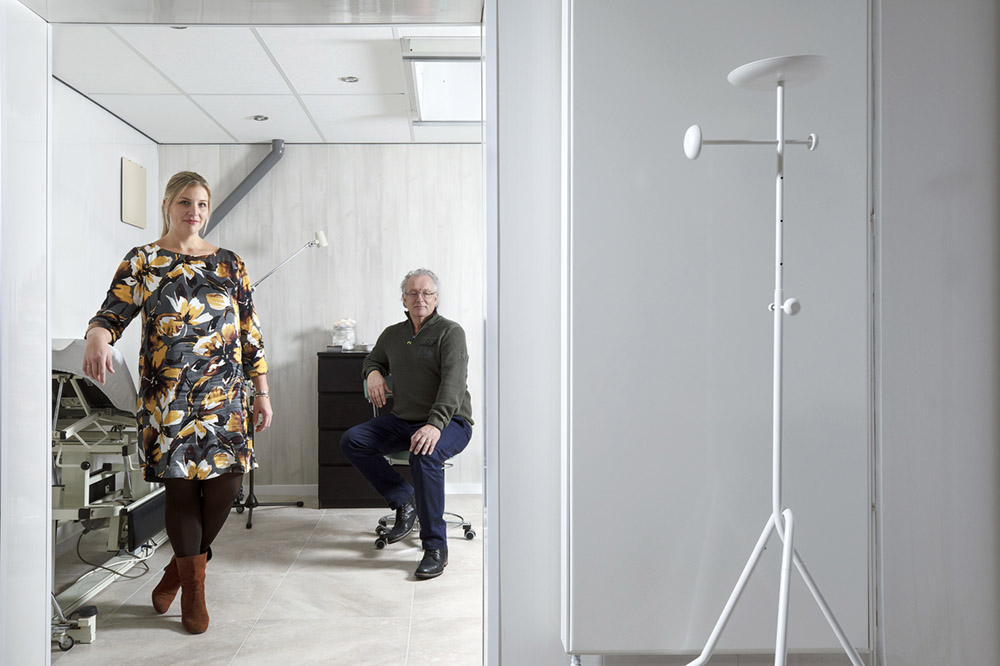“General practice has changed a lot in recent years”
What’s the best thing about being a general practitioner? “Having direct and often long-term contact with people”, agree Frans and Kay Len Macco. “We want to fully understand what’s going on with someone. That’s why we like to take a broad view and consider not only the patient or the symptom, but the whole context.” Father and daughter Macco both studied medicine and trained to be GPs at Maastricht University – he in the 1980s, she recently. Since 2017, they have been running a general practice together with 2,100 patients in Susteren, Limburg.
Consultation hours are over and Frans is about to go on home visits. The great variety that general practice offers still appeals to him after all these years. Just this morning, he’s seen dozens of patients aged between 3 and 98, with a wide range of symptoms and conditions.
Approachable
“As a GP here, you often know immediately what people are talking about when they come in”, says Kay Len. “You know their fears and insecurities, their medical history and family relationships. That makes it easier for us to understand the context of their symptoms. We strive to be approachable; we want our patients to feel heard and understood.”
Although it’s only been 18 months since Kay Len started working in the general practice her father has been running since 1992, the two seem perfectly tuned in to each other. The intense collaboration hasn’t yet thrown up any disadvantages. “So far, I’ve only seen advantages”, Kay Len says. “We need very few words to understand each other. We can also be completely ourselves and discuss everything with each other.”
Impact
In high school, Kay Len quickly realised she would go on to study medicine. “I’ve always been intrigued by the human body and its various syndromes. Still, it wasn’t at all obvious that I’d end up following in my father’s footsteps and becoming a GP.” As the child of a father who was almost always working, Kay Len saw first-hand the disadvantages of old-school general practice. “Even when he’d been on call all night, he’d still be in the office seeing patients the next morning. That was how GPs worked back then. Now we have the huisartsenposten in the Netherlands – the after-hours GP service provided at hospitals – but that didn’t exist at the time, which meant the local doctor often had to work nights and weekends. It had a huge impact on your social life.”

Major evolution
Looking back on their studies in Maastricht, both conclude that medical training has undergone a major evolution. “When I began my studies, there were very few lectures, Problem-Based Learning was just emerging, and little attention was paid to communication skills”, Frans says. “We spent a lot of time in the skills lab and had to figure many things out for ourselves.” The programme today couldn’t be more different, Kay Len says. “I think the curriculum is much more complete than it was when my father was a student.” Father and daughter also have a tip for future GPs: “Do internships at different practices. In small towns and big cities, at healthcare centres and solo practices. That’s how you learn what your preferences are and where you’ll thrive.”
Psychosocial care
“General practice has changed a lot in recent years”, says Frans. “In a way, the workload has been reduced. This is partly because of the huisartsenposten, but also because of the healthcare assistants who take a lot of work off our hands. This means we can give individual patients more time and attention. At the same time, people today often come to their GPs with much more complex problems.” According to the Maccos, this is the greatest challenge faced by GPs today: treating patients with multiple health problems. “As in many other small towns, our patients are relatively old, get sick more often and frequently have multiple conditions. And more and more people are raising the topic of loneliness during consultation hours. Providing psychosocial care is becoming increasingly important, which makes the job much more interesting.”
Also read
-
Flour, family, and forward thinking: the evolution of Hinkel Bäckerei
In the heart of Düsseldorf, the comforting aroma of freshly baked bread has drifted through the streets for more than 130 years. Since its founding in 1891, Hinkel Bäckerei has evolved from a small neighborhood bakery into a cherished local institution.
-
A new wave of talent emerges from the School of Business and Economics
On Sunday, November 30, 2025, the Maastricht University School of Business and Economics (SBE) proudly celebrated the achievements of over 1,461 graduates from both bachelor’s and master’s programs. The festive ceremony took place at the MECC Maastricht and marked a significant milestone for the SBE
-
Roy Broersma (CEI): Guiding Aestuarium from idea to venture
Roy Broersma, director of the Center for Entrepreneurship & Innovation (CEI) at SBE, has been closely involved in guiding Aestuarium from an early student startup to a growing venture. From spotting their potential during the Brightlands Startup Challenge supporting them through CEI.